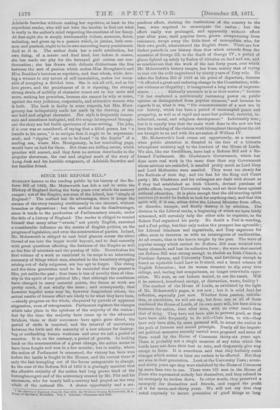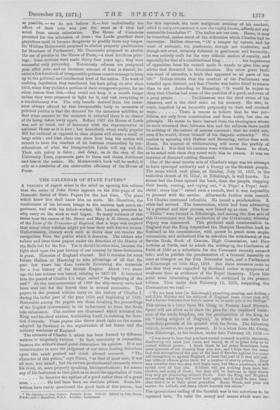SINCE THE REFORM BILL.*
ALREADY known to the reading public by his history of the Re- form Bill of 1832, Mr. Molesworth has felt a call to write the History of England during the forty years over which his memory ranges ; not of the Empire, nor even of the Island, but " simply of England." The method has its advantages, since it keeps the stream of the story running continuously in one channel, without branches or digressions ; but the method has its disadvantages, since it tends to the production of Parliamentary annals, under the title of a history of England. The reader is obliged to remind himself that many other "events," not purely English, exercised a considerable influence on the course of English politics, on the progress of legislation, and even the construction of parties. Indeed, Mr. Molesworth is obliged to cast brief glances across the silver thread of sea into the larger world beyond, and to deal cursorily with great questionsaffecting the fortunes of the Empire as well as the fate Of ministers and the passing of bills. Nevertheless his first volume of a work so restricted in its scope is an interesting summary of things which men, absorbed in the transitory struggles arising out of daily exigences, are too apt to forget. The rising and the risen generation need to be reminded that the present is like, yet unlike the past ; that there is less of novelty than of iden- tity in the spirit of our political life ; that although the conditions have changed in many material points, the forces at work are pretty much, if not wholly the same ; and consequently, that however hopeful some may be, however despondent others, the actual results of human effort are likely to be what they have been, --steady progress on the whole, chequered by periods of apparent stagnation, even of retrogression. Parliament registers the changes which take place in the opinions of the majority of the nation ; but by the time the majority have come up to the advanced thinkers, these or their successors have again gone ahead, the period of strife is renewed, and the interval of uncertainty between the birth and the maturity of a new scheme for destroy- ing or outflanking human weakness and error we call a period of reaction. It is, on the contrary, a period of growth. In looking back on the consummation of a great change, the action seems to have been fought and won in a few months ; but in reality, where the action of Parliament is concerned, the victory has been won before the battle is fought in the Houses, and the contest there is only the last trampling out of the forces antagonistic to change. In the case of the Reform Bill of 1832 it is glaringly manifest that the effective majority of the nation had long grown tired of the boroughmougers and of the aristocracy created by Mr. Pitt and his successors, who for nearly half-a-century had preyed on the very vitals of the national life. A choice opportunity and a stu- • The Magory of Ennlattd, front the Year 1830. By William Nemec MoloBworth, M.A., Vicar or epotland, Rochdale, Vol. L London: Chapman and IfuLl.
pendous effort, shaking the institutions of the country to the base, were required to emancipate the nation ; but the effort really was prolonged, and apparently without effect year after year, until popular force, grown overpowering from resistance, swept away the little knot of monopolists who, for their own profit, administered the English State. There are few darker periods in our history than that which extends from the accession of George III. to the death of George IV., a period of gloom lighted up solely by flashes of victories on laud and sea, and so mischievous that the work of the last forty years, over which Mr. Molesworth's history ranges, has been maiu]y that of trying to root out the evils engendered by ninety years of Tory rule. He takes the Reform Bill of 1832 as his point of departure, because " it effected a great and enduring change in the Constitution, with- out violence or illegallity ; it inaugurated a long series of improve- ments. . . . . distinctly traceable to it as their source ; " because "it has conferred a continuously increasing power on public opinion as distinguished from popular clamour," and because he regards it as, what it was, " the commencement of a new era in our history, which has been a period of unexampled peace and prosperity, as well as of rapid and mani fest political, material, in- tellectual, moral, and religious development." Indubitably true ; but it is equally true that the main work done in the new era has been the undoing of the vicious work triumphant throughout the old era brought to an end with the accession of William IV.
Mr. Molesworth's book comes out opportunely, at a moment when public attention is directed to the fate of a hitherto triumphant ministry and to the Conduct of the House of Lords. We also, like our forefathers, have had a Reform Bill and a Re- formed Parliament. Mr. Gladstone's Government, which has done more real work in the same time than any Government whose services aro recorded, is assailed pretty much as Lord Grey and Lord Melbourne were assailed. They went too slowly for the Radicals of their day, and too fast for the King and Court party ; Mr. Gladstone and his colleagues are dealt with almost as if they had established an Irish Church, devised purchase of public offices, imposed University tests, and set their faces against national education. It is plain enough that the old exacting spirit survives (it would be foolish to look for anything else), and that this spirit will, if it can, either drive the Liberal Ministry from office, or disorder, hamper, and finally destroy it by attrition. The division in the Liberal ranks, a beginning of which we have lately witnessed, will certainly help the other side to organize, as Sir Robert Peel organized his party. No doubt a Peel is wanting, and a Peel policy, but that only makes the prospect lass agreeable ; for Liberal blindness and ingratitude, and Tory eagerness for office, seem to threaten us with an interregnum of mediocrities. At all events, that is the lesson taught by the past. The wave of popular energy which carried the Reform Bill soon trickled into many channels, and lost its collective force ; the wave that carried our Reform Bill was strong enough to abolish an Irish Church, a Purchase System, and University Tests, and fertilizing enough to found an equitable Land Law in Ir eland, and a broad scheme of Euglish Education ; but its waters threaten to slip away into sidings, and, having lost compactness, no longer overwhelm oppo- sition. We wait, as our fathers waited, to see the result. Will it be restored, beneficent energy, or distraction, waste, futility ?
The conduct of the House of Lords, as exhibited by the light of Mr. Molesworth's pages, is not now ; but it is solid food for reflection, especially just now. Whether from passion, calcula- tion, or conviction, we will not say, but from one or all of these combined the House of Lords, of its own mere will, has been able to frustrate the nation, time after time, with no other result than that of delay. They have not been able to prevent good, as they have been able frequently to do evil—Corn laws, to wit—they have only been able, by mere personal will, to arrest the nation in the path of fairness and sound principle. Nearly all the import- ant political measures recently carried were proposed and some of them voted by the House of Commons thirty-six years ago. There is probably not a single measure of any value which the Lords have not done their best to veto, and they rarely give way except to force. It is sometimes said that they foolishly resist changes which sooner or later are certain to be effected. But they are wise in their generation. Look at the University Tests ; seven- and- thirty years ago they were abolished by the House of Commons by more than two to one. There were 187 men in the House of Peers who represented nobody but themselves, and they refused to let monopoly be broken down. In other words, they preserved a monopoly for themselves and friends, and reaped the profit of it for seven-and-thirty years. We will not say that they voted expressly to secure possession of good things as long
as possible, — we do not believe it,— but undoubtedly the effect of their vote was just the same as if they had
acted from astute calculation. The House of Commons provided for the admission of Jews ; the Lords gratified their prejudices until it became dangerous to gratify them any longer. Sir William Moles worth proposed to abolish property qualification for Members of Parliament ; Mr. Duncombe proposed to abolish the use of proxies in the House of Peers,—a most invidious privi- lege ; these motions were made thirty-four years ago ; they were successful only yesterday. Notoriously reforms are postponed year after year, and an immense amount of time is wasted, be- cause a few hundreds of irresponsible persons cannot manage to keep up to the political and intellectual level of the nation. The work of undoing legislation they sanctioned has been going on ever since 1832, when they yielded a portion of their overgrown power, for no other reason than this,—they could not keep it a month longer unless they were prepared to fight for it, and risk everything iu a revolutionary war, The only benefit derived from the resist- ance always offered by this irresponsible body to measures of political justice is that the demand for the measures solidifies, so that when consent to the measure is extorted there is no chance of its being taken away again. Before 1867 the House of Lords was not so much out of harmony with the representative or national House as it is now ; but henceforth every really popular Bill for national as opposed to class objects will create a small or large crisis ; and time alone can show how long the nation will submit to have the conduct of its business trammelled by con- siderations of what the irresponsible Lords will say and do. Their sole policy is delay ; and delay, as in the case of the University Tests, represents gain to them and theirs, detriment and loss to the nation, Mr. Molesworth's book will be useful, if only as a reminder of the obstructive efficiency of the House of Peers.











































 Previous page
Previous page